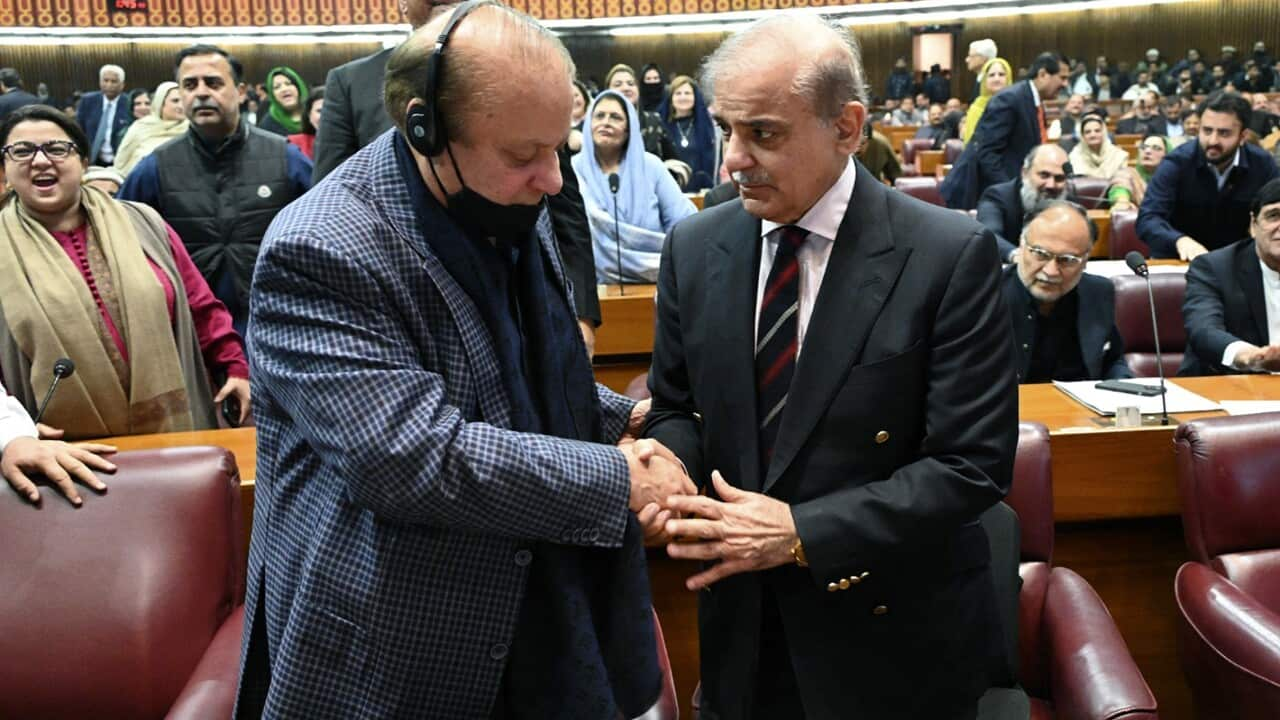TRANSCRIPT
Pakistan's newly formed parliament has elected Shehbaz Sharif as prime minister for a second time, three weeks after uncertain national elections caused delays in the formation of a coalition government.
National Assembly Speaker Ayaz Sadiq says Mr Sharif secured enough votes to be elected the new prime minister.
“Mian Mohammad Shehbaz Sharif Sahib has secured 201 votes. Mian Muhammad Shehbaz Sharif is declared to have been elected as the Prime Minister of the Islamic Republic of Pakistan. ... I request Mian Muhammad Shehbaz Sharif to take the seat of the Prime Minister of the Islamic Republic of Pakistan.”
Mr Sharif beat Omar Ayub, the candidate backed by jailed former Prime Minister Imran Khan, who secured 92 votes.
The declaration was met with loud protests from the Sunni Ittehad Council (SIC) party backed by Mr Khan, with Mr Ayub calling for Mr Khan's and other party members release.
It is believed that if Mr Khan had not been jailed, he would have become prime minister once again.
“Our immediate demand is to have my Prime Minister Imran Khan released, Bushra Bibi (Imran’s wife) should be released, along with Shah Mahmood Qureshi, Chaudhry Pervaiz Elahi and all our women’s activities (should be resumed). All the leadership and workers should be released, bring them out and return our form 47 (election result form) and then we will see what have to do.”
The 8th February election was marred by a mobile internet shutdown, arrests and violence in its build-up and the unusually delayed results triggered accusations that the vote was rigged.
Zartaj Gul is with the Tahreek-e-Insaf political party.
“Shehbaz Sharif cannot deliver to this country because he is not elected by the people of Pakistan, he has stolen the credit of the people, of PTI people and he has stolen the vote of Pakistani people. He cannot deliver, he's been imposed on the public of Pakistan.”
At 72 years old, Shehbaz Sharif brings with him a wealth of political experience, being the younger brother of three-time Prime Minister Nawaz Sharif.
His re-election as prime minister is a continuation of the Sharif family's political dynasty, which has long been associated with the Pakistan Muslim League-Nawaz (PML-N) party.
Mr Sharif was able to become prime minister after Mr Khan was jailed and as the result of the PML-N and the Pakistan Peoples Party (PPP) agreeing to form a coalition government after the 8th of February election.
Mr Sharif won despite candidates backed by Mr Khan gaining the most seats in parliament.
Tariq Javed is a resident of Lahore.
He is displeased Mr Sharif is now prime minister.
“He has become prime minister out of a fake vote in the election, and I don’t think Pakistan’s condition will improve. The situation is further deteriorating and the people are nearly crushed under inflation. The electricity and gas prices have gone up, transport is costly. I don’t think this prime minister will be able to fix things.”
Another local resident, Umar Sharif, doesn't believe Shehbaz Sharif will be able to improve the day to day lives of Pakistanis.
“This (election of prime minister) will not make a difference. The condition of the people is deteriorating day by day and their problems will not be solved by this (election of prime minister). This is the continuity of the same status quo which has prevailed in the country from the beginning and it seems that it will continue to prevail. People are worried about inflation and high prices.”
Shortly after his victory, Shahbaz Sharif spoke to the people of Pakistan to assure them change is coming.
“If we have to change the destiny of Pakistan, I swear to the God Almighty, and with God as my witness, we will overcome together challenges, like the Himalayan mountains, and challenges deeper, like the ocean, and that Pakistan gets its rightful place. ... First, we have to repair the historic relations with America and then build the relationship and later trade, defence, financial and diplomatic relationships, make them better. ... We will make strong relationships with the European Union and middle east countries. We will stand on the principle and equality of neighbouring countries.”
Mr Sharif's government is facing multiple issues, including how to respond to a surge in militant attacks, improve relations with the neighbouring Taliban-run Afghanistan, repair crumbling infrastructure, and resolve year-round power outages.
It must also maintain political stability as Mr Khan’s party has vowed to continue protests against the alleged vote-rigging.
He is due to be sworn in as prime minister on Monday.













